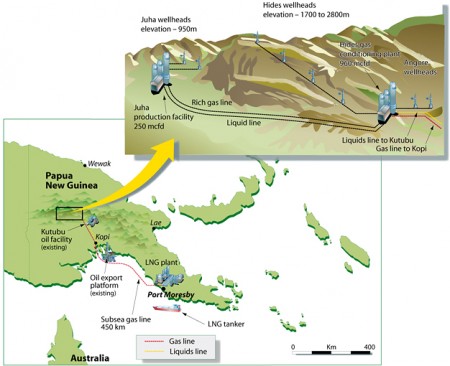You may know that Papua New Guinea (PNG) is a tropical country located on the world’s second largest island in Oceania. You may also know that most of PNG’s 7 million inhabitants live in rural areas. You could call PNG a developing country: In the 2007 Human Development Index it is ranked 148 of 182, between Kenya and Haiti. You may know that PNG is rich of natural resources, including precious metals, timber and oil. What you would not expect, however, is PNG to be a major hydrocarbon producer.
Well, it’s time to revise your knowledge.
In a joint venture with firms from Japan, Australia and Papua, ExxonMobil plans “to develop gas fields in the Southern Highlands and Western Province of PNG and transport the gas via pipeline to an LNG (liquified natural gas) facility near Port Moresby (the capital) for shipment to markets overseas. The project will provide energy for the Asia-Pacific region, jobs and economic benefits for PNG.”
Economic benefits indeed; the question is for whom. According to a study, the project will double the country’s GDP and increase its exports of oil and gas four-fold. This gigantic endeavor – total capital investment is thought to amount to $10 billion, which is as much as the country’s annual GDP – raises two questions. First: Why is PNG’s oil and gas only now being exploited so intensively? Second: What is the project’s overall impact on PNG and its people?

The first question may be easier to answer. It seems that oil and gas companies are still discovering new reserves on the island. Apparently, the treasures of PNG are not yet as well known as those of other countries.
Concerning the second question, however, only a few preliminary thoughts can be offered. It is doubtful that more than a few Papuans are going to benefit from the project, considering the high levels of corruption in the country (PNG is ranked 154 of 180 on Transparency International’s Corruption Perception Index, between Ivory Coast and Paraguay).
On the other hand, the costs of the project seem to be very high in terms of environmental degradation, impact on the country’s rich cultural heritage and human health. According to the Swiss public broadcaster’s correspondent, many politicians and NGOs fear that migration flows caused by the need of thousands of workers will reinforce the spread of HIV and other diseases.
According to the project’s website, the companies involved are very concerned with the impact of their enterprise and promise opportunities for employment and training as well as efforts to promote sustainable development, taking care of the environment and the communities. ExxonMobil tell us (pdf), that the PNG government has approved the project’s Environmental Impact Statement. With the multinational promising to double the GDP of PNG, who do think is more powerful, the country’s Department of Environment and Conservation or the company?
US Secretary of State Hillary Clinton’s last minute cancellation of her visit to Port Moresby shall not discourage us from following PNG and its second hydrocarbon rush more closely. For a start, check out the analysis Linking Growth and Poverty Reduction in Papua New Guinea in the ISN’s Digital Library.

